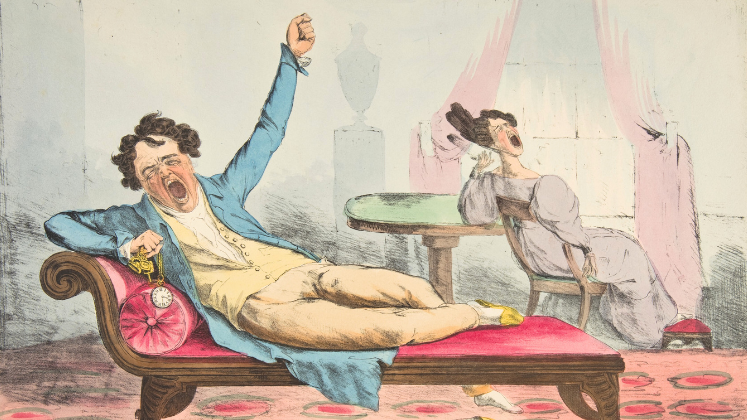Caty Borum‘s The Revolution Will Be Hilarious: Comedy for Social Change and Civic Power considers how comedy intersects with activism and drives social change. Borum’s accessible text draws from case studies and personal experience to demonstrate how comedy can successfully challenge norms, amplify marginalised voices and foster dialogue on issues from racism to climate change, writes Christine Sweeney.
This blogpost originally appeared on LSE Review of Books. If you would like to contribute to the series, please contact the managing editor at lsereviewofbooks@lse.ac.uk.
 Can you teach comedy? Can a sense of humour, charisma, delivery, stage presence and timing be learned? Comedy programmes popping up in universities across the world would say, “Yes, yes it can”. If the question is, “can you teach comedy as a tool for social change and civic power?”, Caty Borum has an entire book which aims to provide an answer.
Can you teach comedy? Can a sense of humour, charisma, delivery, stage presence and timing be learned? Comedy programmes popping up in universities across the world would say, “Yes, yes it can”. If the question is, “can you teach comedy as a tool for social change and civic power?”, Caty Borum has an entire book which aims to provide an answer.
The Revolution Will Be Hilarious: Comedy for Social Change and Civic Power by Caty Borum explores the intersection of comedy and social activism, delving into the question of whether comedy can be taught and used as a tool for social change. Borum discusses the role of creativity, cultural power, and participatory media in driving social change and how postmillennial social-justice organisations collaborate with comedians. Serving as a follow-up to Borum’s work co-written with Lauren Feldman in 2020, A Comedian and an Activist Walk into a Bar: The Serious Role of Comedy in Social Justice, this new book is a how-to manual with case studies on integrating comedy into social justice efforts.
[The] book is a how-to manual with case studies on integrating comedy into social justice efforts.
Borum reflects on her own comedy career, drawing from experiences working with sitcom legend Norman Lear on get-out-the-vote campaigns in the late ’90s and early 2000s like Declare Yourself. While these campaigns engaged young people and demonstrated the power of comedic efforts, Borum notes that the impact on electoral outcomes was limited. Though 2004 saw the largest turnout (nearly 50 per cent) of voters aged between 18 and 24, that demographic still accounted for just 17 per cent of the total voter population, and Bush beat his democratic rival John Kerry to secure a second term.
Although mobilising the public through comedy for direct political action may be too great an ask, Borum emphasises comedy’s narrative power in shaping public understanding and influencing cultural attitudes. The book explores the evolution of comedy in the participatory media age, especially its increased visibility during the pandemic and its role in challenging societal norms. The rise of independently produced content on social media has challenged the authority of networks and studios, boosting the democratisation and creative agency of comedy “content”. Though Borum acknowledges the benefits of social media for amplifying marginalised creators, she falls short of critically examining its impact on mental health, the spread of misinformation and biased algorithms. Despite this, she underscores comedy’s potential as a cultural intervention empowered by the participatory networked media age.
Positive deviance, according to Borum, is the quiet power of comedy that journalism lacks.
The book discusses the comedic response to political events, particularly the rise of Donald Trump, positioning comedy as a force for social change by offering fresh ways of undermining the status quo. According to Borum, comedians say what journalists cannot, thinking of Michelle Wolf, who at the 2018 White House Correspondents dinner pointed out the mutually beneficial cycle of journalists covering then-President Trump’s near-constant news feed. Positive deviance, according to Borum, is the quiet power of comedy that journalism lacks.
Comedy also serves as a creative space for marginalised voices, providing an alternative narrative and critique that traditional journalism may lack. Borum highlights the importance of optimism in comedy. Comedy provides a space for an alternate reality, for example the TV series Schitt’s Creek portrays a world where the LGBTQ community is fully accepted. In this sense, optimism can be a survival tactic. As Borum suggests,
[C]omedy as a force for social justice breaks down social barriers and opens space to discuss taboo topics; persuades because it is entertaining and makes us feel activating emotions of hope and optimism; serves as a mechanism for traditionally marginalized people to assert and celebrate cultural citizenship through media representation; acts as both social critique and civic imagination to envision a better world; and builds resilience to help power continued struggle against oppression.
Borum provides an in-depth, well-researched review of cultural entertainment activists, tracking the power of the entertainment industry to affect how people feel. “Pioneering cultural entertainment activists pushed for ‘mainstreaming’ oppressed people – including and normalizing their lives and lived experiences in entertainment.”
The book is something of a documented workshop, drawing from the experiences and insights of leaders across social justice activism and comedy to emphasise the power of media.
The book is something of a documented workshop, drawing from the experiences and insights of leaders across social justice activism and comedy to emphasise the power of media. Its instructive aspect lies in Borum’s description of running comedy workshops and writers’ rooms, offering a practical guide for both comedians and social activists. These collaborative spaces aim to translate key messages into comedy routines through storytelling, making complex issues more accessible. The author uses climate change and the opioid epidemic as examples, demonstrating how comedy can humanise and mobilise audiences to address pressing challenges.
Borum examines a case study of youth political activist group Hip Hop Caucus which aims to communicate a basic awareness of climate change to Black, Indigenous, and other People of Colour, who are the most affected by, and yet contribute the least to, climate change in the US (and globally). Even if this comedy work may not reach the oil companies responsible for the brunt of climate change, it serves to educate and mobilise audiences. In this sense, the messaging of the book goes, culture is important because it is the mechanism by which we relate to each other. Although it’s hard to demonstrate the material impact of comedy and the entertainment industry overall on political dynamics, communicating the mechanisms translating individual experiences in collective narrative storytelling to foster understanding and support is convincing.
Culture is important because it is the mechanism by which we relate to each other.
The Revolution Will Be Hilarious emphasises the power of comedy as a force for social justice and provides practical insights into its integration with activism. She effectively shows how collaboration between the two has the power to start meaningful conversations around racism, climate change, economic disenfranchisement, addiction and more. Borum’s work serves as a valuable guide for media and communication theorists, entertainment industry professionals, social activists, and comedians, showcasing the potential of collaboration between comedy and activism in sparking meaningful conversations on various societal issues.
The content generated on this blog is for information purposes only. This Article gives the views and opinions of the authors and does not reflect the views and opinions of the Impact of Social Science blog (the blog), nor of the London School of Economics and Political Science. Please review our comments policy if you have any concerns on posting a comment below.
Image Credit: Paul Craft on Shutterstock.







